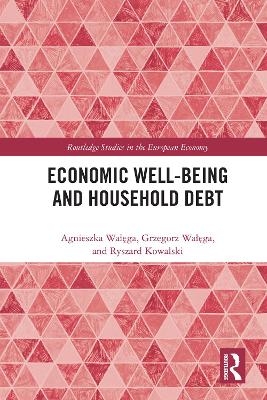
Economic Well-being and Household Debt
Seiten
2024
Routledge (Verlag)
978-1-032-18472-2 (ISBN)
Routledge (Verlag)
978-1-032-18472-2 (ISBN)
This book provides insight into the concepts, measures, and determinants of household indebtedness, over-indebtedness, and well-being by integrating theoretical perspectives, adopting recent analytical methods, using a sample of Polish households.
The growing indebtedness of households reported over the last 30 years and in most developed countries has serious economic and social implications. This book provides insight into the concepts, measures, and determinants of household indebtedness, over-indebtedness, and well-being by integrating theoretical perspectives, adopting recent analytical methods, and using a sample of Polish households.
The authors identified the socio-demographic and economic characteristics of indebted and over-indebted households, as well as the basic characteristics of indebtedness and the differences in its subjective perception among over-indebted households and those that are not over-indebted. They determined the spatial differentiation of over-indebtedness, examining the relationship between economic, social and behavioural factors and over-indebtedness and the role of over-indebtedness in shaping the economic well-being of households. The results of a questionnaire conducted on a sample of Polish households and econometric modelling served as the basis for assessing the economic well-being of indebted households. This assessment was conducted with the use of a composite well-being indicator developed by the authors. Given the multidimensional nature of the issues being analysed, the authors offer an approach that accounts for two separate but overlapping dimensions of economic well-being, namely material and financial, and two ways of assessing each of them: objective and subjective.
The book holds appeal for researchers, scholars, and students of economics, finance, consumer economics, and economic psychology and offers practical guidance for policymakers and advisors who deal with consumer affairs.
The growing indebtedness of households reported over the last 30 years and in most developed countries has serious economic and social implications. This book provides insight into the concepts, measures, and determinants of household indebtedness, over-indebtedness, and well-being by integrating theoretical perspectives, adopting recent analytical methods, and using a sample of Polish households.
The authors identified the socio-demographic and economic characteristics of indebted and over-indebted households, as well as the basic characteristics of indebtedness and the differences in its subjective perception among over-indebted households and those that are not over-indebted. They determined the spatial differentiation of over-indebtedness, examining the relationship between economic, social and behavioural factors and over-indebtedness and the role of over-indebtedness in shaping the economic well-being of households. The results of a questionnaire conducted on a sample of Polish households and econometric modelling served as the basis for assessing the economic well-being of indebted households. This assessment was conducted with the use of a composite well-being indicator developed by the authors. Given the multidimensional nature of the issues being analysed, the authors offer an approach that accounts for two separate but overlapping dimensions of economic well-being, namely material and financial, and two ways of assessing each of them: objective and subjective.
The book holds appeal for researchers, scholars, and students of economics, finance, consumer economics, and economic psychology and offers practical guidance for policymakers and advisors who deal with consumer affairs.
Agnieszka Wałęga is Assistant Professor in the Department of Statistics at the Cracow University of Economics. Grzegorz Wałęga is Assistant Professor in the Department of Microeconomics at the Cracow University of Economics. Ryszard Kowalski is Assistant Professor in the Department of Microeconomics at the Cracow University of Economics.
Introduction 1. Household indebtedness: theories and facts 2. Household indebtedness: empirical analysis 3. The nature of household over-indebtedness: theory and measurement 4. Characteristics of over-indebted households: empirical analysis 5. Household over-indebtedness and well-being 6. The economic well-being of over-indebted households: own research Conclusion
| Erscheinungsdatum | 17.08.2022 |
|---|---|
| Reihe/Serie | Routledge Studies in the European Economy |
| Zusatzinfo | 42 Tables, black and white; 13 Line drawings, black and white; 13 Illustrations, black and white |
| Verlagsort | London |
| Sprache | englisch |
| Maße | 156 x 234 mm |
| Gewicht | 453 g |
| Themenwelt | Sozialwissenschaften ► Soziologie ► Spezielle Soziologien |
| Wirtschaft ► Volkswirtschaftslehre ► Mikroökonomie | |
| Wirtschaft ► Volkswirtschaftslehre ► Wirtschaftspolitik | |
| ISBN-10 | 1-032-18472-8 / 1032184728 |
| ISBN-13 | 978-1-032-18472-2 / 9781032184722 |
| Zustand | Neuware |
| Informationen gemäß Produktsicherheitsverordnung (GPSR) | |
| Haben Sie eine Frage zum Produkt? |
Mehr entdecken
aus dem Bereich
aus dem Bereich
Mentalitäts- und Interessengegensätze im Streit um Transformation
Buch | Softcover (2024)
Campus (Verlag)
CHF 47,60


